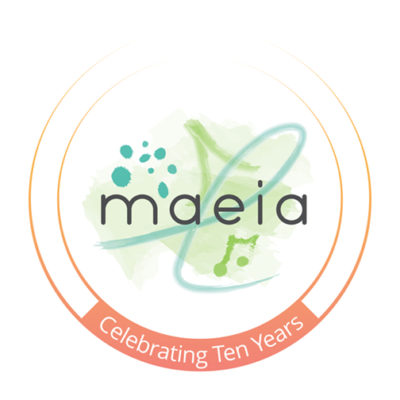
Editor’s Note: Happy 10th Anniversary Michigan Arts Education Instruction and Assessment (MAEIA) project! This is the last in our series celebrating the 10 year milestone. Over the past year we have highlighted a variety of individual voices telling their stories of MAEIA. We heard from early innovators, assessment developers and writers, practitioners, and staff, all highlighting their participation during the first ten years. In this post we look ahead to the next exciting 10 years.
Enjoy all of the 10 year anniversary blog series. Thanks for being a part of our celebration. ~ Joni Starr
_________________________________________________________________________________________________
When gathering MAEIA experiences from individuals over the past year, I also asked each person what they expected the next ten years of MAEIA would bring. Their answers encompassed both the current state and a future state of arts education instruction and assessment. The comments centered on community and partnerships, current and relevant resources, and engaging professional development, all with a focus on equity and access for Michigan’s students.
“Since 2013 when I joined the MAEIA project, I have seen it grow tremendously, and I believe MAEIA will continue to expand its treasure trove of resources and professional learning experiences for educators. MAEIA has so much momentum right now and will continue to cultivate vital partnerships and statewide connections of arts organizations to strengthen support for arts education in Michigan. We do this important work to help ensure that all students have access to a high-quality arts education,” explains Kathy Humphrey, Media/Website Director and Program Review Tool Coordinator.
![]() Linda Wacyk, Director of Communications adds, “I am hopeful for continued partnership with the Michigan Department of Education (MDE), and for MDE leadership to restore at least one arts specialist to their staff who can raise awareness of MAEIA resources and ensure consistent and well-resourced support for educators in the field.”
Linda Wacyk, Director of Communications adds, “I am hopeful for continued partnership with the Michigan Department of Education (MDE), and for MDE leadership to restore at least one arts specialist to their staff who can raise awareness of MAEIA resources and ensure consistent and well-resourced support for educators in the field.”
“I think MAEIA will be a key resource in keeping the arts in our schools. The need for collaboration among educators too often isolated from one another is substantial and MAEIA can fill that role. Whether it is using the assessments as part of improved arts instruction, professional learning about ambitious teaching in the arts, or learning to use the formative assessment process, MAEIA will be there. It is hoped that MAEIA – and the individuals who work in support of it – will be able to maintain, even grow support for the arts,” states MAEIA’s Assessment Director Ed Roeber.
Barb Whitney, Partners Coordinator, says, “I am hopeful that our network of arts education champions will grow exponentially to include a rich diversity of expertise, age, ethnicity, race, gender, ability, and more. As we build our MAEIA Michigan collective, we’re deepening connections toward a strong, tenacious, and inspiring arts education community that values the arts, fosters engagement, and collectively celebrates successes.”
Kathy Dewsbury-White, President and CEO of the Michigan Assessment Consortium and MAEIA Project Director notes, “I hope the Michigan education community comes to use and understand the plethora of resources as theirs and that we see a shift in who is promoting and advancing the use of MAEIA resources. For example, more ambassadors from the fine arts subject matter associations, teacher preparation programs and universities preparing arts teachers with advanced degrees, and a cross section of departments from the Michigan Department of Education (MDE). We have very encouraging evidence from our partners – that when they carry the resources forward they do successfully engage their audiences and membership. Michigan Education Association (MEA) is a great example with respect to providing access to teachers we weren’t interacting with before.”
 Linda Wacyk adds, “My hope is that younger teachers and leaders will get excited about all that the ‘first wave’ has built and bring new energy and ideas to arts advocacy and professional learning programs. I would like to see more teachers embrace MAEIA performance assessments as ways to authentically assess and engage their students and use the results to demonstrate their effectiveness as teachers.”
Linda Wacyk adds, “My hope is that younger teachers and leaders will get excited about all that the ‘first wave’ has built and bring new energy and ideas to arts advocacy and professional learning programs. I would like to see more teachers embrace MAEIA performance assessments as ways to authentically assess and engage their students and use the results to demonstrate their effectiveness as teachers.”
“I expect that MAEIA will continue to foster community among Michigan’s arts educators and awareness of what meaningful performance assessments look like in dance, music, theater and visual arts and how to use them in ways that guide student learning and effectiveness in teaching. Too often educators in the arts are isolated from their colleagues and MAEIA gives them resources and ‘a meeting place’ where ideas can be stimulated and shared,” notes Cheryl Poole, Editor, Project and Website Support from 2011-2017.
“I expect the next ten years of MAEIA will bring a continuation of relevant, meaningful resources and professional learning for arts educators and beyond,” says Heather Vaughan-Southard, Professional Learning Director and Website Support. “We will continue to forge strong partnerships that will advance arts education as an essential part of a well-rounded education as well as a mode of expression that holistically supports the whole child.”
Andy Middlestead, Director, Office of Educational Assessment & Accountability, Michigan Department of Education states, “A goal that I would have, and I know the MAIEA team shares, is that we work to sustain all the excellent work that has happened in the past ten years. I also hope to continue having vibrant meetings of arts educators to further the effort and provide a great source of professional development for these staff.”
“My hope is that the MAEIA project would continue to flourish and help support the arts and teachers in Michigan,” Cecilia Gollan, Art teacher, shares. “The materials produced help give the arts a consistent assessment process, which has been lacking in the arts for a while. I also would like to see assessments revised and new ones added, as well as, additional resources created.”
Art teacher, Janine Campbell adds, “I expect continuing work and updating of assessments as well as what programs should looks like for students in Michigan and beyond!”
“I see MAEIA continuing to bring Arts Educators together over the next 10 years and beyond. The assessments will continue to be used, modified and improved creating a strong and vibrant structure for teachers in each of the arts disciplines to collaborate,” ![]() notes Barb Michelutti, Professional Development and Media/Web Support Director, 2011-2016. “I believe students will ultimately benefit from seeing the arts as part of the core subject areas of their education. I also expect that educators in other disciplines will continue to grow in their realization that the arts are essential to a comprehensive education for K-12 students providing them with experiences that develop their brains in amazing ways.”
notes Barb Michelutti, Professional Development and Media/Web Support Director, 2011-2016. “I believe students will ultimately benefit from seeing the arts as part of the core subject areas of their education. I also expect that educators in other disciplines will continue to grow in their realization that the arts are essential to a comprehensive education for K-12 students providing them with experiences that develop their brains in amazing ways.”
Kathy Dewsbury White explains, “If we manage to get the MAEIA assessments and resources embedded in schools so that they support the district’s continuous improvement process, we could hope for a systematic effort to rebuild arts programming that has been degraded over the past two decades, (and we have a great start) this is very important because increasing access to quality arts education is the underlying aspiration we have for children in Michigan. It’s what drove us for these last ten years.”
“Over the next ten years of MAEIA I expect that the work will continue to remain current, and that the present needs of educators will continue to be addressed. I believe that the resources will continue to grow, and hope that we are able to continue to spread them across Michigan,” notes Executive Assistant, Karrie LaFave.
“The MAEIA project has continued to develop new resources and expand into new areas over the years, such as demonstrating educator effectiveness, collaborative scoring of MAEIA assessments, and curricular and instructional materials,” explains Kathy Humphrey. “Most recently, MAEIA has expanded its content to include Social Emotional Learning and Culturally Responsive Teaching. I expect the next ten years of MAEIA will bring more expansion of content and more resources to meet the needs of the field.”
Ana Cardona, Arts Education Consultant, 2011-2019, says, “I hope that the MAEIA community remains curious and questioning as a way of keeping the work relevant and in pace with the needs of the times. I also hope MAEIA leadership continues to provide a voice for arts learning and for policies that ensure equal access to quality arts learning for all students.”
“I expect the MAEIA project will continue to build on the universal design focus by more explicitly calling out the role of arts education in supporting diversity, equity and inclusion,” states Vince Dean, former Director, Office of Standards and Assessment for MI Department of Education.
![]() Heather Vaughan-Southard shares, “I expect the next ten years will bring more rigor and more community. I expect that MAEIA will continue to convene thoughtful, passionate people who believe in arts education and will collectively deliver a more equitably art-filled reality for Michigan’s students and concrete support for arts educators.”
Heather Vaughan-Southard shares, “I expect the next ten years will bring more rigor and more community. I expect that MAEIA will continue to convene thoughtful, passionate people who believe in arts education and will collectively deliver a more equitably art-filled reality for Michigan’s students and concrete support for arts educators.”
Kathy Humphrey emphatically states, “Viva la MAEIA!”
Click here for a Printer friendly version of this article.

Leave a Reply
You must be logged in to post a comment. Don't have an account? Register Here.